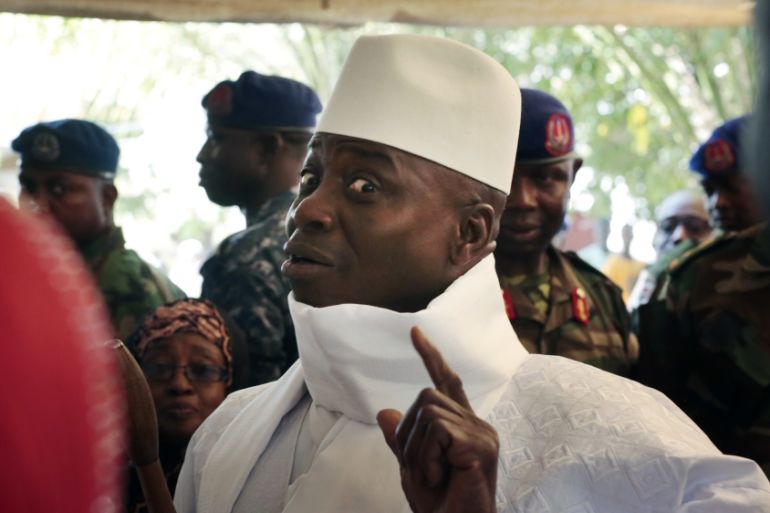The Gambia delays report on former longtime leader Jammeh
Probe was ordered into crimes committed under The Gambia’s former longtime leader Yahya Jammeh.

The long-awaited findings of a probe into crimes committed under The Gambia’s former longtime leader Yahya Jammeh have been delayed, investigators said.
A panel called the Truth, Reconciliation and Reparations Commission (TRRC) was scheduled to ceremonially hand over its findings to President Adama Barrow on Thursday. But the final report will now be released at a later date, a member of the TRRC told the AFP news agency, saying, “We are not yet ready.”
Keep reading
list of 3 itemsGambia’s Jammeh ‘handpicked’ women for rape, abuse
Gambia’s ex-President Yahya Jammeh ‘stole at least $362m’
The TRRC was set up in 2017 following Jammeh’s defeat to Barrow in the December 2016 elections.
After a six-week standoff that ended in military intervention by neighbouring countries, Jammeh flew to Equatorial Guinea.
Styled on the lines of South Africa’s post-apartheid Truth and Reconciliation Commission, the TRRC heard testimony from nearly 400 people from January 2019 to May 2021 about Jammeh’s 22-year rule.
Witnesses gave evidence about state-sanctioned torture, death squads, rape and witch hunts, often at the hands of the “Junglers”, who acted as Jammeh’s death squads.
‘Frustration of victims’
Reed Brody, a US lawyer calling for Jammeh to be prosecuted, said the postponement was announced “to the frustration of victims”.
The findings, spanning 16 volumes, had initially been due for release in July.
In April 2020, the TRRC published an interim report describing rights violations under Jammeh as “massive, appalling and diverse” including torture, extrajudicial killings, rape, enforced disappearances, arbitrary arrest and detention.
The TRRC is not empowered to prosecute those responsible for crimes.
In its final report, it may recommend prosecution for perpetrators or propose an amnesty for those who have testified about their crimes and expressed remorse, except in the case of crimes against humanity.
Jammeh gained power through a bloodless coup in 1994 and was repeatedly re-elected, in votes often condemned as bogus, until his defeat to Barrow.
Barrow has said he will await its report before seeking any further action against his predecessor.
After receiving the report, the government has six months in which to respond to its recommendations.
December vote
The postponement came in advance of December 4 presidential elections in which Barrow intends to run.
In early September, Jammeh’s political party announced an alliance with the governing party, a move that was condemned by watchdogs.
The Gambia Centre for Victims of Human Rights Violations said the team-up was a “threat to the government’s implementation of the TRRC’s recommendations”, accusing Barrow of “abandoning grieving Gambian citizens to return to the arms of this murdering and raping tyrant”.
Emmanuel Kwesi Aning, director of the faculty of academic affairs and research at the Kofi Annan International Peacekeeping Training Centre, told Al Jazeera from Accra that the reason behind the delay seemed to be linked to the coalition deal.
“It’s not only about being scared, but also the embarrassment and discomfort of a government that ended a 22-year brutal rule now cutting a very disturbing deal with a previous regime just for electoral success,” said Aning.
“I think it leaves a sense of unease. Knowing the testimonies that people gave to the TRRC, it would be very difficult for the government to justify the 360-degree turn from a government that respected human rights and rule of law and start to make some restitution to those who had suffered.”